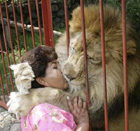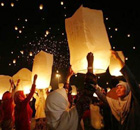H1N1 treatment is economic worry
By Yang Wanli (China Daily)
Updated: 2009-12-22 09:55
 |
Large Medium Small |
As the increase of A/H1N1 flu cases in the city slows, worries are growing among some patients and families not only about their lives, but about the financial burdens.
"My husband had been here for more than 10 days, and it has cost me about 200,000 yuan," said a young woman waiting outside of ICU at Ditan Hospital, one of the two best hospitals for treating infectious diseases alongside You'an Hospital.
The Beijing woman, who declined to be named, said she had been forced to borrow money from her relatives.
For families like her who live in Beijing, healthcare insurance does help to cover some medical bills.
But for those migrants from other provincial areas, curing A/H1N1 is a heavy burden.
On the morning of Dec 18, an A/H1N1 patient from Heilongjiang province died in Beijing, leaving 70,000 yuan of debt to the hospital, according to the Beijing Youth Daily.
An unnamed doctor at the hospital revealed it was not the first time for A/H1N1 patients not to pay for medical treatment.
Beijing Youth Daily reported yesterday a similar case of a 32-year-old pregnant farmer from Hebei province who had been in hospital for more than three weeks, but couldn't afford the expensive medical treatment.
In order to save her life, doctors had to use an artificial lung. The cost of curing her disease topped 200,000 yuan but she was only able to pay the hospital 30,000 yuan.
Doctors told Beijing Youth Daily that most patients who cannot afford the medical payment are either poor or migrant workers, lacking in medical insurance.
The government said from Aug 20, it would no longer provide free medical treatment for A/H1N1 patients. Those citizens with medical insurance can get part of the payment back from insurance companies.
However, migrants without medical insurance cannot get financial support from insurance companies.
Even for citizens with medical insurance, when the policy is actually put into practice, much of the medicine and equipment isn't listed in the insurance details.
Deng Xiaohong, a press official from the Beijing health bureau, said in early December that the average cost to treat a mild patient of A/H1N1 flu was about 500 to 600 yuan, but 70,000 to 80,000 yuan was needed for a severe case.
But for some cases, the medical fees can rise even higher.
If the patient needs to use extracorporeal blood circulation, they must pay 350,000 yuan for a single treatment, a doctor told Beijing Youth Daily yesterday.
By far the cheapest option is prevention. By last Tuesday, 2.3 million people had received inoculations in Beijing and the rate of adverse effects was less than three in every 10,000. Inoculation remains free in the city until Jan 15.









